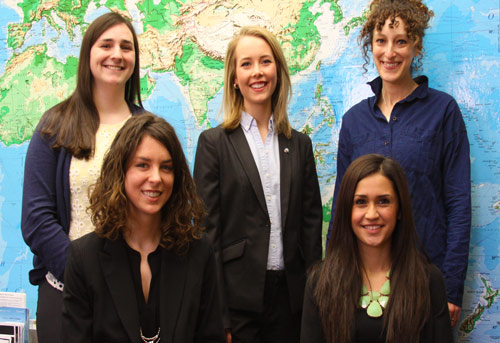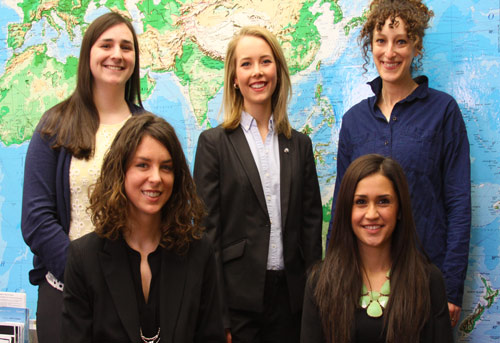Martin Scholars 2015
The impact of political ideology on the environment in post-WWII Germany. Whether Fair Trade is a viable model to improve working conditions in the cut flower industry. How environmental perceptions contribute to waste management policies in landfills. The way community perspectives on the Colorado River translate to water polices and usage.
This year’s class of Martin Scholars is studying seemingly discordant topics, but all hinge on one key idea: that people in different communities imagine, and thus experience, their environments in different ways, and that this dissonance can lead to startling real-world effects.
The four seniors — Alysha Van Zante, Emily Greene, Karlee Kirking and Celina Hernandez — have been working with instructor and English faculty member Erin James since fall semester to prepare major research papers on a topic of their choosing examining “environments across communities.”

To explore the idea, the scholars queried the ways in which various communities — ranging from indigenous residents to tourists, corporate stakeholders to environmental activists — perceive and understand the environment in which they live and work. The students also looked into what complications such differing perceptions of place stand to pose for cross-community communication and policy formation.
James said the students met as a group to grapple with case studies of differing environmental imaginations and what role they play in cultural and/or cross-community conflict. Each week they examined a different type of dissonance, including those stemming from colonialism, tourism, religion, national governance and science.
The Martin Scholars program, now in its 10th year, is sponsored by UI’s Martin Institute, in the College of Letter, Arts and Social Sciences’ Internationals Studies Program.
While the four students have very different projects, they still meet weekly to share research findings and ideas, James said.
Each Martin Scholar said her time in the program have been the highlight of her studies at Idaho.
Van Zante, a Boise native, came to the University of Idaho intending to pursue degrees in chemistry and Spanish. She hoped to attend medical school to become a physician and work for Doctors Without Borders.
“But I knew really early in my first semester, I lacked a true passion for the science field,” she said.
Van Zante decided to apply to the Martin Scholars program because it would be a challenging experience and give her the opportunity to grow.
“I can always use practice in writing, and felt that my research skills could be bolstered,” she said. “I was very excited about having the opportunity to design my own in-depth research project.”
Greene, also from Boise, was attracted to the opportunity to conduct in-depth research, as well as the opportunity to work closely with a professor related to her research interest.
“Literature and the environment are really different from what I have studied, so it has been really interesting to bring that into the discussion and apply it to areas that I do have experience in,” she said.
Kirking of Lewiston was most interested in the scholars program because she could focus specifically on a region and issue emphasis.
“I was impressed that it both required global knowledge and regional and issue specific knowledge to be successful in the program,” she said. “I applied because it just made perfect sense.”
Hernandez of Moses Lake, Washington, said she was interested in taking part in an opportunity that allows her to further her studies.
“I feel that the Martin Scholars program offered me an opportunity to gain more from my major while also challenging my research abilities,” Hernandez said.
At this point in their studies, the four have strong hopes for their work.
“I hope to have written a paper that is informative and useful for policy makers,” said Van Zante. “I hope that someone will read my paper and think a little more deeply about water in the United States than they did before.”
Greene said she would like to believe she has expanded her knowledge about the region and international affairs in ways she hadn’t considered before. Her earlier courses certainly helped, she said.
“It really opened my perspective of how we can look at different issues” Greene said. “Literature is very representative of the reality of the world where people live and it is a way of expressing first hand perspectives in ways we don’t always consider when looking at international issues.”
Greene hopes to become a much more competent researcher and writer, with solid experience that she can use in the future.
Kirking also expects to produce a quality project that could be useful to either academic or professional sources.
“I expected to become extremely knowledgeable on a specific topic, and to exchange ideas on environmental imaginations with my cohorts,” Kirking said. ”So far it has proved a challenging, but rewarding experience.”
Hernandez said the experience will broaden her knowledge and understanding of international relations, especially those in her area of interest and emphasis.
“I also hope to bring attention to one international issue of community through my extended research,” she said.
The four seniors in this year’s Martin Scholars program studied four very different areas to see the impact of community perceptions on the environment.
Emily Greene’s project focused on how the partition of a state influences the environment, using the example of Germany after World War II.
The differences between how the environment was treated in both East and West Germany shows how political ideology, such as the communist party in East Germany, can have a really strong impact on the environment, she said.
“A large part of my paper is focused on how to overcome the division that partition creates in the event of reunification. It looks at what unified Germany did to overcome the environmental degradation of the east.
“Germany is a very fascinating example, because the partition was strongly influenced by ideology and the environmental situation in East Germany became very bad. But despite all of that, Germany has been able to become a leader in Europe on environmental matters in the last 25 years since reunification.”
Karlee Kirking’s project takes a look into the environmental imaginations surrounding flower production and purchasing behavior.
The cut flower industry that supplies U.S. demand for fresh bouquets for Valentine's Day and Mother's Day are often produced in substandard labor conditions, she said. There are many options for addressing substandard labor conditions, including corporate social responsibility and consumer boycott, but these often have little effects or adverse effects on the targeted behavior.
“I chose to see if the Fair Trade model that has been successful from a demand perspective in the United States would be viable for the floriculture industry,” Kirking said. “The results of my study found that due to market structure, consumer demand, and a host of labeling initiatives, there has been and probably will continue to be problems making Fair Trade flowers a viable solution for the United States.
“The United States seems to be less open to this kind of initiative due to the different culture American consumers have regarding flower purchasing.”
Celina Hernandez examined and analyzed the circumstance in which large communities of trash-pickers gather in and around landfills near mega cities. She examined two specific mega cities and their landfills: Lagos Landfill in Lagos, Nigeria, and Bordo Poniente in Nezahualcoyotl near Mexico City.
She compared and contrasted the environmental imaginations associated with the two case studies and the trash-pickers that have made a home in these landfills. Hernandez reviewed how these very different environmental perceptions have contributed to the success and/or failure of waste management policies in the two very different landfills.
“I will propose and discuss possible approaches, policy reformations, and solutions in dealing with these communities that can be applied not only to the respective landfills, but to other mega cities that host similar communities of trash,” she said.
Alysha Van Zante looked at the Colorado River in terms of how communities view the river and how that translates to water policies and water usage.
“I am examining several clashing perspectives such as users in the North and the South, farmers and conservationists and societal values of the past and present,” she said. “My paper focuses on how different perspectives about the use of Colorado River water leads to conflict among communities and results in dysfunctional policies.”
She also has collected some historical context about water appropriations, and describes the legislative documents governing the river, examine the parties in each mentioned conflict and make suggestions of lessons to be learned.
Article by Sue Hinz, College of Letters, Arts and Social Sciences







